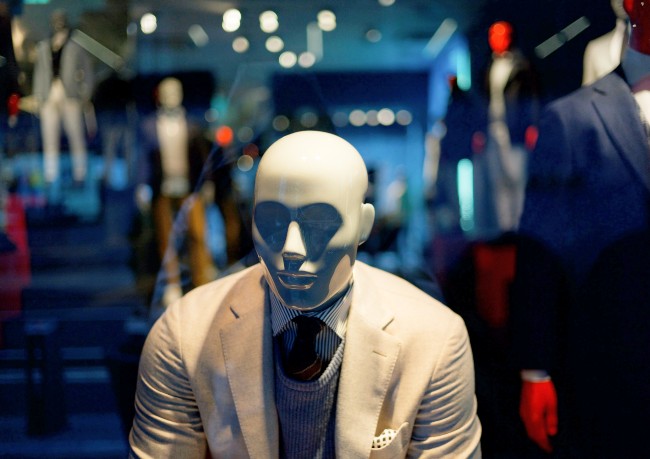
Newly Updated
Image: Dim Hou
Feel like a fraud in your job? As though you're only a fraction of yourself from Monday to Friday? Or, worse, someone else altogether? This is likely affecting more than just your mood. Natasha shares a story from a career changer who inspired the term 'Half-Deck Behaviour', and explains how it could be keeping you stuck in your shift.
"I live a double life. There's the 'me' I am at work, and then there's the 'me' I am at home. And if the two 'me's met, I don't think they'd get along very well."
What I hear over and over again from career changers is that you feel like you're not yourself at work.
Or, if you are, it's only in a small way, every now and again.
The rest of the time, you're performing; pretending to be someone you're not; contorting yourself to fit into an oddly shaped box and trying to look happy about it.
Or you feel like you're half-yourself at work, using some of your skills and talents and kind-of-half-enjoying it, but there's a lot more to you that never gets to come out and play in your career.
It's as if your work and your life are two separate entities, which require you to be two different versions of yourself (Jekyll-and-Hyde style), when all you're craving is to feel like yourself, full time.
This 'halfway state' is likely to have crept over into the way you go about your career change, too

And it might just be what's keeping you stuck.
Last year I worked with an accountant, Joe, who had been trying to change career for over a year. He was frustrated and close to giving up on his shift, because, in his words:
"I've tried everything. I've been to recruitment agents, I've gone to industry networking events, I've spent hours honing and refining and adapting my CV. I've had a specialist look at my LinkedIn profile. I've used strengths tests and personality tests and career profiling tools, and I must have read every career book out there."
What Joe found most frustrating wasn't so much the fact that he hadn't yet moved into work he loved. It was the fact that he felt just as inauthentic in the process of changing career as he did in his day job.
"I pick up the phone to recruitment consultants and I go into 'career' mode. My voice changes, I use different words, I don't laugh… all my friends know me as a communicative, funny guy, and yet when I've got my working hat on I turn into a very straight-laced, businesslike character. And there's nothing wrong with that on its own, but I do wonder how I'm ever going to find work that I truly enjoy when I'm still playing a role, even in my pursuit of something more authentic."
Joe was self-aware enough to pick up on something that many people can't see clearly, through no fault of their own.
We're well-trained from a young age to think about work in a specific light: work is what happens from Monday to Friday, 9–5. It's a responsibility and often a chore; something you have to do, whether you like it or not. It even has a dress code and a vocabulary all of its own.
And the way we relate to work as a concept has an effect on how we behave, automatically, when we come into contact with it.
We stand a certain way, or we introduce ourselves in a particular manner. We communicate differently, and, crucially to the career-change conversation, we express some aspects of ourselves while keeping others hidden.
Your 'work' persona was a successful strategy for you, for a while

It got you to where you are now, and for that we can be grateful.
But when you're seeking a career and a working life where you can feel totally yourself, it doesn't make sense to bring that way of being into the journey with you. It just makes it more likely that you'll get more of what you already have.
When Joe was approaching recruitment consultants and talking to people at networking events, he was playing the role of 'Work Joe'.
He was formal and polite, he used his elevator pitch to describe what he did, and, ultimately, that had an effect on the opportunities that people offered him.
Recruitment consultants looked at his CV and saw a focused, sensible accountant who listened well and played by the rules. So, naturally, they considered and sought out other opportunities that would suit that kind of person.
When he met people at networking events, again, he noticed 'Work Joe' being the one to talk to them.
Even when Joe was at home, thinking about what he wanted to do next with his career – what he might love to do – 'Work Joe' would be hanging around.
And Joe discovered that 'Work Joe' was a pretty unimaginative and pushy character. He would jump in and answer the questions on career profiling tools for Joe. He'd shoot down career ideas as soon as Joe came up with them, calling them things like 'unrealistic', or 'pie-in-the-sky', or 'risky'.
It's important to remember that Joe wasn't being totally inauthentic at work. 'Work Joe' wasn't a fictional character he was playing; in many ways he was a sensible, focused and businesslike man.
The problem was that there was much more to him than that, and so he found himself feeling limited, restricted, small.
And if he was playing small in the way he went about his career change, it was unlikely he was going to wind up getting the big result that he wanted: a career that felt like a full expression of who Joe was.
"It was as though I was only playing with half the cards in a deck – how was I ever going to win?"
Half-deck behaviour takes a huge variety of forms, and it's often tricky to spot

Because people are so well trained in keeping 'career' separate from 'life', many half-deck behaviours slide by unnoticed.
You don't even realise that you're not playing full out, because you simply can't imagine what it would be like to bring your whole self to play at work.
So you certainly don't bring your whole self to your shift.
I'd love to know how many of the following are true for you:
- You've made lists of your strengths and weaknesses by looking at your career history
- You've spent a lot of time thinking about your 'transferable skills'
- You've updated your CV / résumé, changed the font, played with layouts, added bullet points and a shiny new summary at the top, but it still just looks like a list of 'Things I Don't Want To Do Any More'
- When you imagine turning one of your hobbies or extra-curricular interests into your career, you smile, but you'd never really follow it up, because it's not 'work', it's fun.
- Coming up with new ideas for your future career mostly consists of scrolling endlessly through job boards on your lunch break from work (and also mid-afternoon when you're supposed to be finishing that report, and also at 2.30 in the morning, square-eyed and exhausted)
- You feel like you've forgotten what you enjoy doing
- You feel like you've got nothing to offer a new industry, because you've spent so long becoming successful in a field you don't enjoy
- You feel like this whole 'career you love' conversation could be an urban myth – something other people can have, but not you.
- You're disappointed in your natural talents, because they're not the kind of thing that translates into a career
These could all be half-deck behaviours for you.
It's important to remember there's nothing inherently wrong with any of them – half-deck behaviour isn't about the activity so much as the fact that you could have access to more options, opportunities and ideas by bringing your whole self to the party.
What cards are you not using in your career change?

This question isn't one you'll be able to come up with the answers to right away.
Everyone's hidden cards will be different. But it's a fascinating question to explore over time.
What are you so naturally good at, you don't even realise it's a strength to celebrate and tell people about? (Hint: I often ask people to observe the way they brush their teeth for this one. You can tell the super-organised and focused from the creative and innovative as soon as the paste hits the brush.)
What are you known for and loved amongst your friends and family?
What is it about who you are that gets you great results in life (not just at work)?
What do you wish you could do or say or express in your current career, that isn't being expressed now?
What are you proud of about yourself that you don't get to use at work?
What are you secretly passionate about? (So passionate and so secret, you don't even think about it anymore because it hurts to know you can't have it.)
What would it be like if you could bring the answers to these questions to the process of your career change? If you were fully self-expressed and fully yourself while you were making a shift?
If you decided to play with a full deck, how would you go about your career change?

How would you play full out as you made your shift – including using the parts of you that you're currently hiding at work?
Perhaps you'd take those 'hare-brained' ideas about making your hobbies and interests into a career and experiment with them – because offbeat and unrealistic as they may seem, they might just work out.
Perhaps you'd seek out people who were bringing their full selves to work with them every day, using unlikely talents in unusual contexts, and find out how they made it work.
Rather than looking for companies and jobs and organisations that would accept you, you might approach the ones who inspire you and start a conversation.
Maybe you'd come to the powerful, earth-shaking realisation that everyone who's ever made something worth talking about has done so from a place of authenticity (and most of them were 'weirdos' who capitalised on their unique blend of skills and interests).
Your LinkedIn profile would probably be a straight-talking, authentic expression of your achievements, interests, and all the things you're excited and passionate about, no matter what they were.
You might even stop sending out your CV and a carefully-crafted-but-ultimately-inauthentic cover letter to companies you don't really want to work for, and instead start cultivating meaningful relationships with people who do work you admire.
You might use your skills and talents and passions to make a strong first impression on them.
Playing with a full deck is an ongoing challenge, and it makes the process of career change faster, more authentic, and a lot more fun

Joe decided to spend a couple of weeks playing a game.
He knew that when he was around his kids, he felt the most authentic and expressed. He was responsible and focused as a parent, and he was also deeply playful and funny and communicative. For him, feeling at work the way he felt around his kids was the ultimate dream.
So, every time he felt 'Work Joe' starting to emerge, he'd think of his kids. And something about that thought brought out the playfulness he needed to balance 'Work Joe's influence – not to get rid of 'Work Joe', because he had some great skills too, but just to level the playing field a little.
And it emerged in small ways at first.
When he went to networking events, he'd focus on making the people he talked to laugh. He made a point of spending a maximum of five minutes talking about what he did for a living, and then work on guiding the conversation away from career-related topics and discussing wider life – an opportunity for him to share as much of who he was with people as possible.
And, strangely enough, these small tweaks led to some amazing opportunities showing up.
A month before, Joe had been introduced by a friend to a man who needed an accountant. They'd talked business, he'd agreed to do a very small piece of work for him, and that was the end of that.
When Joe spoke to him next, he set 'Work Joe' off to one side. He made some jokes, shared his gratitude for something this client had done to make the job easier, and mentioned his passion for using business to make the world a better place… and suddenly his client lit up.
It turned out that this client was also the Head of CSR for a major bank, and was always looking for people with skilled numbers brains.
Based on what Joe had shared with him, he had a feeling Joe wouldn't be happy in a corporate environment, but asked if Joe might consider working with them on a consultancy basis for a year-long contract, from home – where he could spend more time with his kids.
This may not be Joe's perfect job, and he may still have a way to go with his career change. But what he's discovered is that simply bringing a few more cards onto the table has opened up more of a realm of possibilities, options, and ideas than he ever dreamed were possible.
And now, he's pretty sure it's possible to find a career where that double life he was living is a thing of the past.
Where do you notice half-deck behaviour in your shift? Let me know in the comments below!




